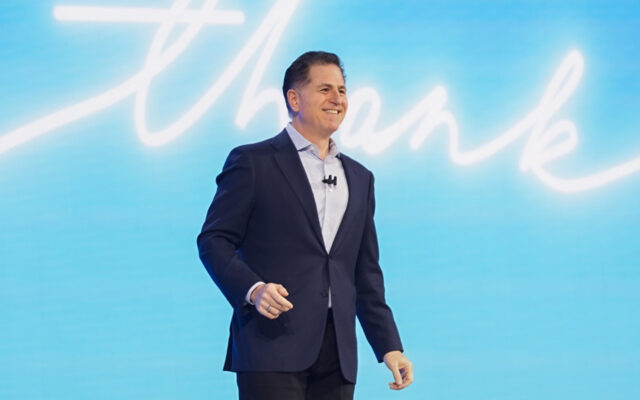Michael Dell describes the 40 years since he established his namesake company in a University of Texas dorm room as “an age of miracles,” and somehow, he considers it an opening act to the progress within humankind’s reach today.
Artificial intelligence represents “a generational opportunity for productivity, innovation, and growth,” Michael Dell said Monday in a keynote at Dell Technologies World in Las Vegas. And while the founder and CEO said he was no more able to predict how far or how fast the latest technology revolution would propel humanity than he was 40 years ago, he’s “more excited and confident in the opportunity ahead than I have been in my life.”
In a way, all the work has done to this point has helped lay the foundation for AI, for the transition from computation to cognition. The company’s deep understanding of the importance of data in its many forms and locations, as well as its commitment to industry partnerships that emphasize customer innovation position it well for the rise of AI.
Like the innovators and entrepreneurs that spurred the industrial revolution, Dell is focused on reinventing the way society works. The company is emphasizing customer success in establishing and optimizing AI, and it’s doing so with what it calls AI factories.
Dell Monday made several product announcements, including the introduction of its AI Factory; an expansion of the AI Factory in partnership with NVIDIA; and AI-focused advancements in its PowerStore storage line.
At different times throughout his talk, Michael Dell welcomed ServiceNow CEO Bill McDermott, Samsung SDS CEO Dr. Sungwoo Hwang, and NVIDIA Founder and CEO Jensen Huang to the stage to discuss Dell’s instrumental role in powering, developing, and using AI.
Every workload will be transformed by AI, McDermott said. “This is really big, and it’s moving really fast.”
McDermott noted that AI and the productivity improvements it can fuel are a top priority for CEOs across industries. ServiceNow’s partnership with Dell, he said, is turbocharging the change those leaders are insisting upon.
ServiceNow’s generative AI products, built on Dell platforms, “are solving massive problems tech couldn’t solve before,” McDermott said, highlighting the fact that the ServiceNow platform “runs 24/7 on Dell. Dell makes AI more intelligent.”
“Dell Technologies is delivering comprehensive AI solutions, all in one place, and customers are already benefiting,” Dell said before introducing Hwang.
Samsung SDS, an IT and cloud services company with a corporate customer base, has been using large language models to automate an array of functions for customers. The company chose to build its AI model on-prem on Dell PowerEdge servers to meet the security requirements of customers interested in “hyper-automation,” Hwang said.
Samsung SDS turned to Dell last year when GPUs were in short supply, Hwang said. Today, the company is providing GenAI services to more than 100,000 users at its customer companies, he said.
Hwang said he expects the Dell AI Factory to contribute to the establishment of AI sovereignty for companies through strong data security and customized AI service development.
The Dell AI Factory is based in part on a partnership with NVIDIA, and Dell welcomed NVIDIA Founder and CEO Jensen Huang to the stage to talk about the partnership between the companies, as well as the rapid pace at which AI is developing.
That rapid development includes a complete refresh of the Dell AI Factory, positioning the companies at the forefront of a breakthrough in the way people view progress.
“The big idea of AI,” Huang said, “is that irrespective of the source of information, we can learn the meaning of that information from the data. Not only can we learn the meaning, we can translate from one modality to another. We can generate from text to image, for example, or from the properties of a protein to a vaccine.”
This shift requires companies to change they way they view themselves, Huang said. “Instead of producing software, we’re producing intelligence. Every company is intelligence, an intelligence manufacturer. Every company will be an AI company.”
“That’s the giant new thing we’re doing together,” Huang said. “This is the first and largest generative AI go-to-market in history. Only Dell has the ability to build compute, networking, storage, software… and help you stand it up. From the ground up, we’re building AI factories and delivering to the world’s enterprises.”
Perhaps unlike the pilots of the industrial revolution in the 18th and 19th centuries, Michael Dell feels an unmistakable responsibility to society and to the path of human progress.
He’s keenly aware that the benefits of AI must be reaped responsibly. “The question isn’t how big is AI going to be,” the CEO said. “It’s how much good is AI going to do?”
“In the wrong hands and put to the wrong means, it’s a powerful threat,” Michael Dell said of AI. “AI should be trained within the parameters of our morality, beliefs, our laws, and humanity. Because eventually artificial intelligence will be at the center of our lives, our security, commerce, education, science, and health care, advancing progress at breathtaking speed.”
Michael Dell also recognized that AI’s development will require large amounts of infrastructure and energy, and those things shouldn’t be put to work wastefully.
“We’re doing our part,” he said. “For decades we’ve been reducing the energy consumption of our solutions,” he said. “We’re committed to running the greenest infrastructure and helping you meet your goals. Sustainable data centers keep energy costs down and minimize usage with more efficient hardware, smart power management, optimized thermals, liquid and air cooling, and using green energy sources.”
Dell software, he said, tracks and forecasts energy and emissions, and automates power management.
When hardware reaches the end of its usefulness, Dell has innovative asset recovery, refresh and recycle programs that retire older systems responsibly.
“For us to realize the possibilities of AI, we need to do it responsibly and address the barriers to adoption holistically,” Michael Dell said.
He encouraged governments to adopt an “AI-first” investment strategy that focuses on strong infrastructure development and agile regulation that emphasizes innovation. “We stand ready to support government leaders and together shape a safe, innovative and inclusive future for AI,” he said.
“By making the right decisions today, we can take advantage of an opportunity coming to the global economy that will define future generations,” he said. “If we don’t, that would be a shame, a loss for us all, for the world.”


